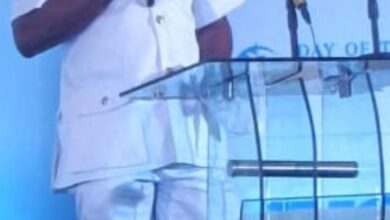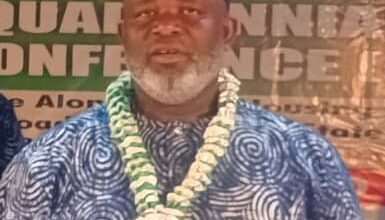Port efficiency: NPA MD, Bello Koko advocates concessioning of ports to one operator.
Port efficiency: NPA MD, Bello Koko advocates concessioning of ports to one operator.

Segun Oladipupo
The Managing Director of Nigerian Ports Authority (NPA), Mr. Bello Koko has said that the ports in Nigeria would have been more efficient if they were concessioned to one operator as obtained in some other African countries.
The NPA MD stated this at the Maritime session during the Nigerian Economic Summit Group discourse at Transcorp Hilton Hotel in Abuja on Monday.
He said that the sole operator would be responsible for the development of the port without having to wait for others to join in carrying out the necessary works.
Koko who lauded the efforts of the present terminal operators, maintained that one operator would have done better.
His words, “Before concession, vessels were staying for two, three months at anchorage because of port inefficiency and then there was concession and we have seen a massive and tremendous improvement and reduction in ship waiting time
“However, the space that was formerly used for stacking and warehousing of cargo has now been turned to business locations and spaces by terminal operators
“What government did then was to break the place into pieces and have like 25 terminal operators and we know how efficient some terminal operators are.
“Imagine if only one terminal operators was handling the port for instance, that is the port efficiency we are seeing in other ports in Africa. You find one person responsible for everything in the port but that is not the case in Nigeria.”
Reacting to questions from the moderators of the Maritime session, he pointed out myriads of problems bedeviling the sector which according to him, include collapsed port infrastructure, multiple checkpoints along port access road, lack of effective automation, lack of collaboration with sister agencies, duplication of duty, among other factors.
He added that some of the ports are 100 years old. “Tincan is in bad state, Apapa is cracking, Warri is bad, there is no port in Nigeria that is not having a problem especially Tincan and Apapa.
“These two ports account for over 75 percent of the cargo inflow into the country
“The President and Minister for Marine and Blue Economy have mandated us to rehabilitate the areas.
“Lekki has enough area which is why they are able to load and offload ten or twenty containers but terminal operators in Tincan Island are using Rubber Gantry crane and that crane can only move a container at a time and if the space is not enough, they have three to five and if they are moving at the same time, they can only move five containers instead of sea to shore cranes that can take twenty containers at a time. That is the beginning of inefficiency.
“Because it takes Lekki some few hours or a day to discharge a vessel, we have to multiply that by three or four for Tincan and Apapa.”
On cargo examination, he fumed over the fact that the Nigeria Customs Service rely solely on hundred percent physical examination of cargoes which he said contributes to delays in cargo clearance process.
“After spending two to three days discharging the vessel, the next problem is how is that cargo inspected. I think probably the last time we had a functional scanner operated by the Nigeria Customs Service was probably 2013, 2014
“There is a hundred percent cargo examination at all port locations. It is not efficient, it is not sustainable, you cannot physically examine all the containers that come into the port.
“While we can take less than 5 to 10 minutes to scan a container in Lekki, other port locations take 3, 4, 5 days to a week and they have to physically bring out everything that is in that container and examine it and send it back but in a normal situation as in Lekki, the cargo is on a truck, the truck drives through it, and if it shows red, it means something is wrong with the cargo.
“The second thing is the access roads themselves, NPA is not responsible for the access roads.
“Before you even get to the port, you see multiple government agencies most of them with fragmented departments, some of the government agencies have up to 3, 4 departments
“You clear a container here, you move to point B, another division or department is stopping you and continuously like that.
“Let’s use this opportunity to thank the new CG because he has shown tremendous interest in solving all these problems because any port he visits and finds a problem, he finds a solution to it.”







